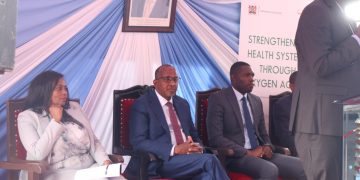By Lilian Okwili
World Health Organisation (WHO) has issued new recommendations to establish global care standards for healthy pregnant women and reduce unnecessary medical interventions. Worldwide, an estimated 140 million births take place every year.
Most of these occur without complications for women and their babies. Yet, over the past 20 years, practitioners have increased the use of interventions that were previously only used to avoid risks or treat complications, such as oxytocin infusion to speed up labour or caesarean sections.
“We want women to give birth in a safe environment with skilled birth attendants in well-equipped facilities. However, the increasing medicalisation of normal childbirth processes are undermining a woman’s own capability to give birth and negatively impacting her birth experience,” says Dr Princess Nothemba Simelela, WHO Assistant Director-General for Family, Women, Children and Adolescents.
“If labour is progressing normally, and the woman and her baby are in good condition, they do not need to receive additional interventions to accelerate labour,” she says Childbirth is a normal physiological process that can be accomplished without complications for the majority of women and babies.
However, studies show a substantial proportion of healthy pregnant women undergo at least one clinical intervention during labour and birth. They are also often subjected to needless and potentially harmful routine interventions.
The new WHO guideline includes 56 evidence-based recommendations on what care is needed throughout labour and immediately after for the woman and her baby. These include having a companion of choice during labour and childbirth; ensuring respectful care and good communication between women and health providers; maintaining privacy and confidentiality; and allowing women to make decisions about their pain management, labour and birth positions and natural urge to push, among others.
To reduce unnecessary medical interventions, the WHO guideline states that the previous benchmark for cervical dilation rate at 1 cm/hr. during the active first stage of labour (as assessed by a pantograph or chart used to document the course of a normal labour) may be unrealistic for some women and is inaccurate in identifying women at risk of adverse birth outcomes.
The guideline emphasizes that a slower cervical dilation rate alone should not be a routine indication for intervention to accelerate labour or expedite birth. “Many women want a natural birth and prefer to rely on their bodies to give birth to their baby without the aid of medical intervention,” says Ian Askew, WHO Director, Department of Reproductive Health and Research.
“Even when a medical intervention is wanted or needed, the inclusion of women in making decisions about the care they receive is important to ensure that they meet their goal of a positive childbirth experience.” Unnecessary labour interventions are widespread in low-, middle- and high-income settings, often putting a strain on already scarce resources in some countries, and further widening of the equity gap. According to Kenya Democratic and Health Survey 2014, 5 000 to 6 000 women die while giving birth in Kenya.
As more women give birth in health facilities with skilled health professionals and timely referrals, they deserve better quality of care. About 830 women die from pregnancy- or childbirth-related complications around the world every day – the majority could be prevented with high-quality care in pregnancy and during childbirth.
Disrespectful and non-dignified care is prevalent in many health facilities, violating human rights and preventing women from accessing care services during childbirth. In many parts of the world, the health provider controls the birthing process, which further exposes healthy pregnant women to unnecessary medical interventions that interfere with the natural childbirth process.
Achieving the best possible physical, emotional, and psychological outcomes for the woman and her baby requires a model of care in which health systems empower all women to access care that focuses on the mother and child. Health professionals should advise healthy pregnant women that the duration of labour varies greatly from one woman to another.
While most women want a natural labour and birth, they also acknowledge that birth can be an unpredictable and risky event and that close monitoring and sometimes medical interventions may be necessary.
Even when interventions are needed or wanted, women usually wish to retain a sense of personal achievement and control by being involved in decision making, and by rooming in with their baby after childbirth.












